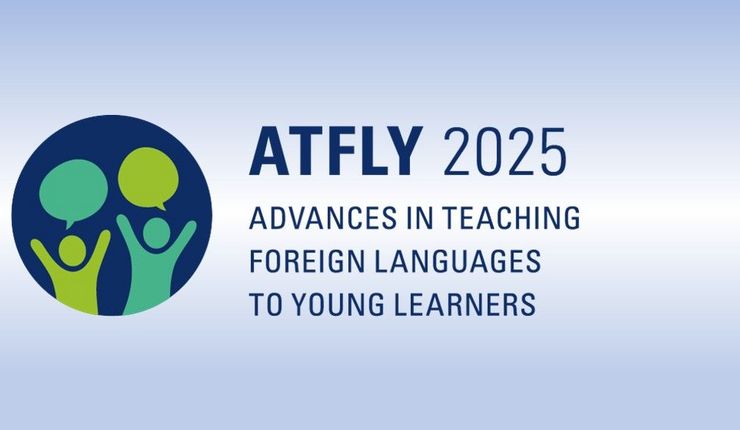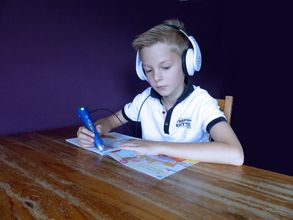Teaching English in Primary School
News
Team
Our Research Interests
Study Program
This section provides students with information on the Teaching English in Primary School modules and stay aborad requirements as well as with useful links and reading recommendations.
Module 05-GSD-EN01: Teaching English at Primary Level 1
This module contains the following courses:
Lecture "Introduction to Language Teaching at Primary School"
Seminar "Planning for the Primary EFL Classroom"
Seminar "Methods and Techniques for the Communicative Language Classroom"
Module 05-GSD-EN02: Teaching English at Primary Level 2
This module contains the following courses:
Seminar "Literature, Culture and Media in the Primary English Classroom"
Seminar "Understanding the Primary EFL Classroom"
Weekly Teaching Practicum "Schulpraktische Studien III". More details on the SPS practicum can be found herE.)
More detailed information on the sequence of these modules and of your course of studies for the core subject English can be found herE.
One of the admission requirements for the First State Examination is the successful completion of one or several stays in an English-speaking country, totaling at least two months.
More detailed information on this can be found in the Lehramtsprüfungsordnung as well as in the LaSuB's Acknowledgement Guidelines
Please also note in this context the various options to schedule your modules ( Studienverlaufspläne.)
- Studienführer Teaching English in Primary school at University of Leipzig
- Saxon Curriculum for English in Primary school
- Common European Framework of Reference (CEFR)
- The 2018 Companion Volume to the CEFR
- The CEFR Bank of Supplementary Descriptors, e. g. for Young Learners (Pre-A1)
- The ACFTL Proficiency Guidelines
- Tell It Again! The Storytelling Handbook for Primary School Teachers
- Grundschule Englisch (Zugang über VPN)
- Primary Communication Boxes (über die Lernwerkstatt ausleihbar)
- Lit4School
- Bleistein, T., Smith M. K., & Lewis, M. (2013)
Teaching Speaking. Alexandria: TESOL International Association. - Böttger, H. (2020)
Englisch lernen in der Grundschule. Eine kindgerechte Fachdidaktik (3rd ed.). Berlin: Cornelsen. - Böttger, H. (Ed.). (2020)
Didaktik für die Grundschule: Englisch (6th ed.). Berlin: Cornelsen. - Brewster, J., Ellis, G., & Girard, D. (2002)
The primary English teacher's guide (2nd ed.). London: Pearson Longman/Penguin English. - Brown, H. D. (2014)
Principles of language learning and teaching (6th ed.). White Plains, NY: Pearson Longman. - Brown , H. D., & Abeywickrama, P. (2010)
Language Assessment: Principles and Classroom Practices (2nd ed.). White Plains, NY: Pearson Longman. - Brown, H. D., & Lee, H. (2015)
Teaching by principles. An interactive approach to language teaching methodology (4th ed.). White Plains, NY: Pearson Longman. - Büngers, B., & Büngers, K. (2014)
Bewegtes Lernen! Englisch: Inhalte in und durch Bewegung nachhaltig verankern (3rd ed.). Donauwörth: Auer. - Cameron, L. (2001)
Teaching languages to young learners. Cambridge: Cambridge University Press. - Celce-Murcia, M., Brinton, D. M., & Snow, M. A. (Eds.). (2014)
Teaching English as a second or foreign language (4th ed.). Boston: Heinle. - Copland, F., Garton, S., & Davis, M. (2012)
Crazy animals and other activities for teaching English to young learners. London: British Council. - Diehr, B., & Frisch, S. (2008)
Mark their words: Sprechleistungen im Englischunterricht der Grundschule fördern und beurteilen. Westermann. - Ellis, R. (1985)
Understanding second language acquisition. Oxford: Oxford University Press. - Ellis, R. (2008)
The study of second language acquisition (2nd ed.). Oxford: Oxford University Press. - Elsner, D. (2010)
Englisch in der Grundschule unterrichten: Grundlagen, Methoden, Praxisbeispiele. München: Oldenbourg. - Elsner, D. (2013)
Bilingual education in primary school : aspects of Immersion, CLIL and bilingual modules. Tübingen: Gunter Narr Verlag. - Elsner, D. (2015)
Kompetenzorientiert unterrichten in der Grundschule: Englisch: 1. - 4. Schuljahr. München: Oldenbourg. - Emery, H., & Rich, S. (2015)
Teaching English to young learners. Alexandria: TESOL International Association. - Emmit, M., Komesaroff, L., & Pollock, J. (2007)
Language & learning: An introduction for teaching (4th ed.). South Melbourne: Oxford University Press. - Enever, J., & Schmid-Schönbein, G. (2006)
Picture books and young learners of English. München: Langenscheidt. - Garton, S., & Copland, F. (Eds.) (2019)
The Routledge Handbook of Teaching English to Young Learners. Abingdon: Routledge. - Gass, S. M., Behney, J., & Pollock, L. (2013)
Second Language acquisition: An introductory course (4th ed.). New York: Routledge. - Gass, S. M., & Mackey, A. (Eds.) (2012)
The Routledge handbook of second language acquisition. Abingdon: Routledge. - Hall, G. (Ed.) (2016)
The Routledge handbook of English language teaching. London: Routledge. - Hasselgreen, A., & Claudwell, G. (2016)
Assessing the language of young learners. Sheffield: Equinox. - Hinger, B., & Stadler, W. (2018)
Testen und Bewerten fremdsprachlicher Kompetenzen. Tübingen: Narr. - Ioannou-Georgiou, S., & Pavlou, P. (2003)
Assessing young learners. Oxford: Oxford University Press. - Klippel, F. (2000)
Englisch in der Grundschule. Handbuch für einen kindgemäßen Fremdsprachenunterricht. Berlin: Cornelsen Scriptor. - Klippel, F., & Doff, S. (2012)
Englischdidaktik: Praxishandbuch für die Sekundarstufe I und II. Berlin: Cornelsen Scriptor. - Kötter, M. (2017)
Wortschatzarbeit im Fremdsprachenunterricht: Grundlagen und Praxis in Primarstufe und Sekundarstufe I. Seelze: Klett Kallmeyer. - Kötter, M., & Rymarczyk, J. (Eds.) (2011)
Fremdsprachenunterricht in der Grundschule: Forschungsergebnisse und Vorschläge zu seiner weiteren Entwicklung. Frankfurt/M.: Peter Lang. - Kötter, M., & Rymarczyk, J. (Eds.) (2015)
Englischunterricht auf der Primarstufe. Neue Forschungen – weitere Entwicklungen. Frankfurt/M.: Peter Lang. - Kronisch, I. (2015)
Spontanes Sprechen im Englischunterricht der Grundschule. Methoden, Aufgaben und Ideen für mehr Interaktion. Berlin: Cornelsen. - Larsen-Freeman, D. (2011)
Techniques and Principles in Language Teaching (3rd ed.). Oxford: Oxford University Press. - Legutke, M. K., Müller-Hartmann, A., & Schocker-v. Ditfurth, M. (2009)
Teaching English in the primary school. Stuttgart: Klett. - Lightbown, P. M., & Spada, N. (2013)
How languages are learned (4th ed.) Oxford University Press. - Linse, C. (2005)
Practical English language teaching: Young learners. New York: McGraw-Hill. - McKay, P. (2006)
Assessing Young Language Learners. Cambridge: Cambridge University Press. - Mindt, D., & Schlüter, N. (2007)
Ergebnisorientierter Englischunterricht. Für die Klassen 3 und 4. Berlin: Cornelsen Scriptor. - Mindt, D., & Wagner, G. (2009)
Innovativer Englischunterricht für die Klassen 1 und 2. Braunschweig: Westermann. - Mitchell, R., Myles, F., & Marsden, E. (2013)
Second language learning theories (3rd ed.). New York/London: Routledge. - Murphy, V. A. (2014)
Second language learning in the early school years: Trends and contexts. Oxford: Oxford University Press. - Nixon, C., & Tomlinson, M. (2005)
Primary communication box: Speaking and listening activities and games for younger learners. Cambridge: Cambridge University Press. - Nixon, C., & Tomlinson, M. (2005)
Primary reading box: Speaking and listening activities and games for younger learners. Cambridge: Cambridge University Press. - Nunan, D. (2010)
Teaching English to young learners. Anaheim: Anaheim University Press. - Palmer, S., & Böttger, H. (2005)
Englisch in der Grundschule: Spracherlebnis mit Ergebnis. Puchheim: pb-Verlag. - Papp, S., Rixon, S., & Field, J. (2018)
Examining Young Language Learners: Research and practice in assessing the English of school-age learners. Cambridge: Cambridge University Press. - Pienemann, M., Keßler, J.-U., & Roos, E. (Eds.) (2006)
Englischerwerb in der Grundschule: Ein Studien- und Arbeitsbuch. Stuttgart: UTB. - Pinter, A. (2017)
Teaching young language learners (2nd ed.). Oxford: Oxford University Press. - Richards, J. C., & Renandya, W. A. (Eds.) (2002)
Methodology in language teaching: An anthology of current practice. Cambridge: Cambridge University Press. - Richards, J. C., & Rodgers, T. S. (2014)
Approaches and methods in language teaching (3rd ed.). Cambridge: Cambridge University Press. - Roche, J.-M., & Suñer Muñoz, F. (2017)
Sprachenlernen und Kognition: Grundlagen einer kognitiven Sprachendidaktik. Tübingen: Narr. - Saville-Troike, M., & Barto, K. (2016)
Introducing second langauge acquisition (3rd ed.). Cambridge: Cambridge University Press. - Schmid-Schönbein, G. (2008)
Lehrerbücherei Grundschule: Didaktik und Methodik für den Englischunterricht. Berlin: Cornelsen Scriptor. - Schmidt, J. (2014)
Rituale im Englischunterricht der Grundschule (3rd ed.). Hamburg: Persen Verlag. - Shin, J. K., & Crandall, J. A. (2014)
Teaching young learners English: From theory to practice. Boston: Cengage Learning. - Slattery, M., & Willis, J. (2001)
English for primary teachers. A handbook of activities and classroom language. Oxford: Oxford University Press. - Sternitzke, S. (2015)
Let‘s start talking! Materialien zur Förderung des Redeanteils der Schüler im Englischunterricht, Band 1. Kempen: BVK. - Tyler, A. E., Ortega, L., Uno, M., & Park, H. I. (Eds.) (2018)
Usage-inspired L2 instruction: researched pedagogy. Amsterdam: John Benjamins Publishing Company. - Ur, P. (2012)
A course in English language teaching. Cambridge: Cambridge University Press. - Walsh, S. (2013)
Classroom discourse and teacher development. Edinburgh: Edinburgh Univeristy Press. - Webb, S., & Nation, P. (2017)
How vocabulary is learned. Oxford: Oxford University Press. - Wysocki, K. (2010)
Kooperatives Lernen im Englischunterricht: Die Kommunikationsfähigkeit aktiv fördern - vom ersten Schuljahr an. Essen: Neue-Dt.-Schule-Verl.-Ges..









